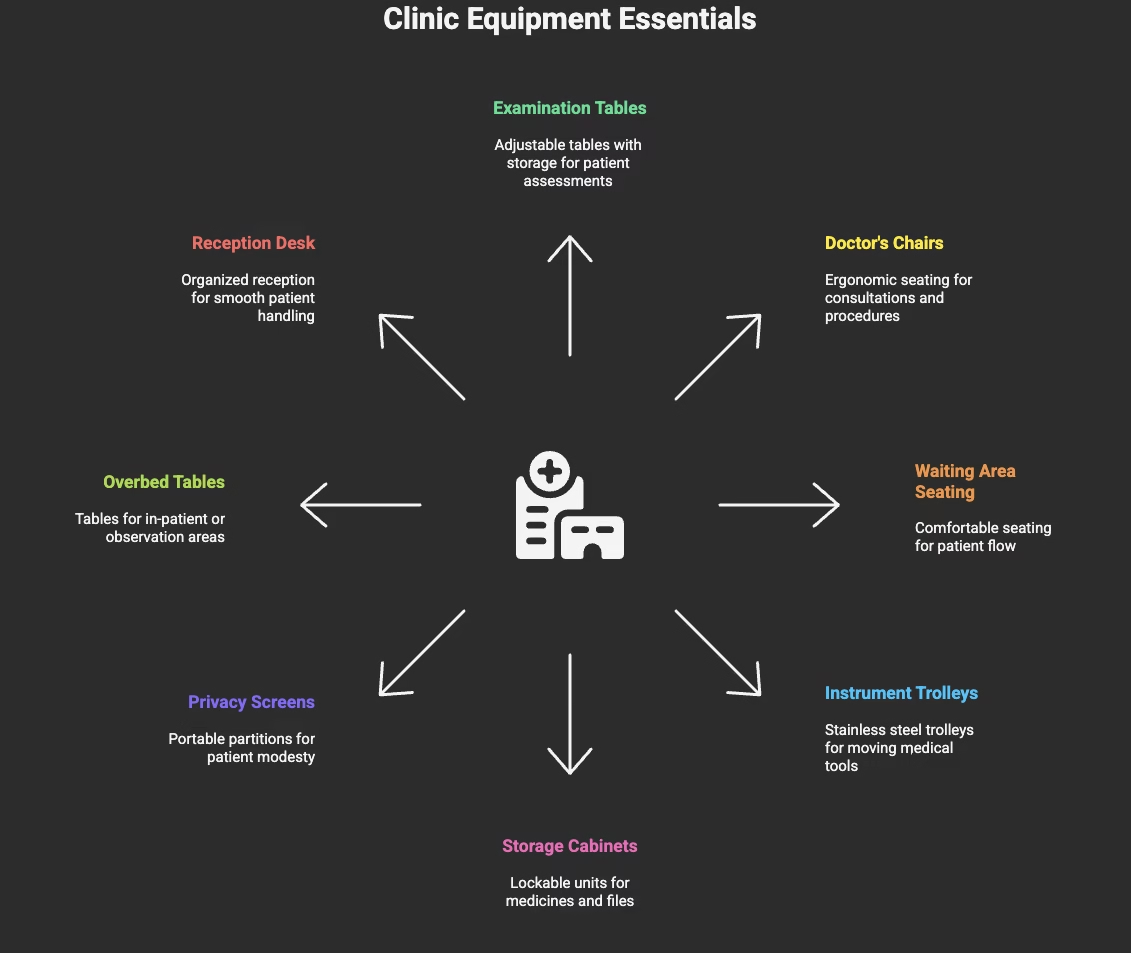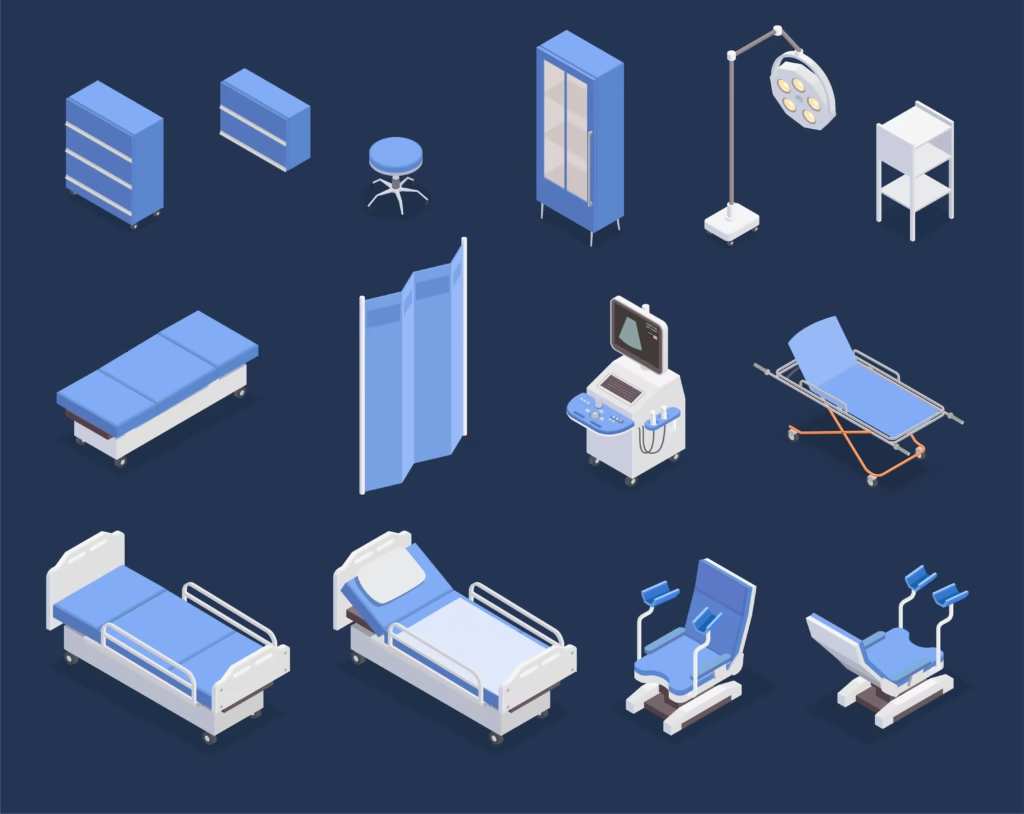Top-Selling Medical Furniture Items for New Clinics
Table of Contents
Introduction
Opening a new clinic requires more than just skilled staff and a good location.
It also demands the right medical furniture items to ensure smooth operations, patient comfort, and compliance with healthcare standards.
Whether you’re a first-time clinic owner or a supplier stocking inventory for healthcare MSMEs,
understanding which items are essential, which ones sell the most, and how to budget for them is critical.
This guide is designed to help doctors, clinic managers, and suppliers make informed purchase decisions that balance quality, functionality, and cost.
What Are the Essential Medical Furniture Items Every New Clinic Must Buy Before Opening?
For a clinic to operate effectively from day one, certain medical furniture items are non-negotiable.
These are not just for aesthetics; they directly impact patient care and workflow efficiency.

Priority Checklist for First-Time Clinic Owners:
- Examination Tables – Adjustable, padded tables are essential for patient assessments. Choose models with storage drawers for instruments.
- Doctor’s Chairs and Stools – Ergonomic seating for long consultations and procedures.
- Waiting Area Seating – Comfortable, easy-to-clean chairs or benches to accommodate patient flow.
- Instrument Trolleys – Stainless steel trolleys for moving medical tools, dressing kits, or consumables between rooms.
- Storage Cabinets – Lockable units for medicines, patient files, and equipment.
- Privacy Screens – Portable partitions for patient modesty during examinations.
- Overbed Tables – Useful in clinics with inpatient or observation areas.
- Reception Desk & File Storage – Organized reception ensures smooth patient handling.
Why these items matter:
- Without examination tables and privacy screens, patient handling becomes inefficient and uncomfortable.
- Lack of proper storage increases the risk of misplaced medical supplies.
- Quality waiting area furniture sets the first impression for patients.
Pro Tip: Start with multi-functional medical furniture items—like examination tables with built-in storage—to save space and cost.
Which Medical Furniture Items Are the Top-Sellers in India for Small and Medium Clinics?
Understanding what sells the most helps suppliers plan inventory and helps new clinics prioritize purchases.
In India, the demand for medical furniture items is driven by functionality, durability, and price sensitivity.
Top-Selling Medical Furniture Items:
- Standard Examination Tables – Both fixed-height and hydraulic models.
- Visitor Chairs for Waiting Areas – Powder-coated steel frames with cushioned seats.
- Stainless Steel Instrument Trolleys – Rust-resistant and easy to sanitize.
- Lockable Medicine Cabinets – Wall-mounted or floor models with glass doors.
- Revolving Doctor’s Chairs – Height-adjustable and cushioned for long hours.
- Folding Privacy Screens – Lightweight and easy to move between rooms.
- Overbed Tables – Particularly in clinics with post-procedure observation beds.
- Stool with Foot Ring – Popular in dental, ENT, and small surgery setups.
Buying Behavior Trends:
- Tier 2 & 3 Cities: Higher preference for low-maintenance, rust-proof furniture due to weather conditions.
- Specialty Clinics: ENT, dental, and physiotherapy clinics often demand custom-designed tables and chairs.
- Budget-Conscious Buyers: Opt for locally manufactured models over imported furniture to save 20–30%.
Insight for Suppliers: Keeping fast-moving models in stock can reduce delivery time, a major deciding factor for clinics choosing suppliers.
How Much Should a New Clinic Budget for Examination Tables, Waiting Area Seating, and Storage Units?
Budgeting for medical furniture items is one of the most crucial steps in setting up a clinic.
Costs vary depending on quality, brand, and location, but having a ballpark figure helps in financial planning.
Average Price Ranges (India):
- Examination Tables: ₹12,000 – ₹35,000 (basic fixed to premium hydraulic)
- Waiting Area Seating: ₹1,800 – ₹4,500 per chair, or ₹9,000 – ₹15,000 for a 3-seater bench
- Lockable Storage Units: ₹10,000 – ₹25,000 depending on size and material
Estimated Budget for a Small Clinic Setup:
- Examination Table – ₹20,000
- 6 Waiting Area Chairs – ₹12,000
- Storage Cabinet – ₹15,000
Total: ₹47,000 (approx.) for these three categories alone
Cost-Saving Tips:
- Buy in bulk for discounts (especially if setting up multiple branches).
- Opt for combo packages offered by medical furniture suppliers.
- Consider refurbished furniture for non-patient-facing areas.
Pro Tip for New Owners: Budget at least 15–20% of your total clinic setup cost for medical furniture to ensure quality and durability.
Where Can Clinics Source Durable and Affordable Medical Furniture in India?
Finding the right supplier for medical furniture items can make a big difference in cost, quality, and after-sales support.
Key Sourcing Channels:
- Medical Equipment Hubs:
- Delhi (Bhagirath Palace)
- Mumbai (Princess Street, Grant Road)
- Chennai (Parrys Corner)
- Delhi (Bhagirath Palace)
- Online B2B Marketplaces:
- IndiaMART, TradeIndia, and Alibaba for bulk orders.
- IndiaMART, TradeIndia, and Alibaba for bulk orders.
- Direct Manufacturers:
- Partnering directly with manufacturing units in Ambala, Pune, and Coimbatore can save 15–25% in costs.
- Partnering directly with manufacturing units in Ambala, Pune, and Coimbatore can save 15–25% in costs.
- Local Medical Furniture Dealers:
- Quicker delivery and easy servicing.
- Quicker delivery and easy servicing.
Checklist Before Buying:
- Ask for product warranty and service commitments.
- Check material quality—prefer stainless steel or powder-coated finishes for hygiene and durability.
- Ensure compliance with medical-grade standards.
Pro Tip: For specialty clinics (dental, physiotherapy, ophthalmology), choose suppliers with customization options.
Should Clinics Buy Medical Furniture Outright or Consider Leasing to Save Initial Costs?
When setting up a clinic, cash flow is often tight.
Deciding whether to purchase medical furniture items outright or lease them depends on your financial plan and growth forecast.
Buying Outright:
- Pros:
- Full ownership from day one
- No monthly payments
- Long-term cost savings if used for many years
- Full ownership from day one
- Cons:
- Higher upfront cost
- Ties up working capital
- Higher upfront cost
Leasing/EMI Purchase:
- Pros:
- Lower initial investment
- Option to upgrade after lease term
- Keeps cash free for marketing and operations
- Lower initial investment
- Cons:
- Total cost over time can be higher
- Some restrictions on modifications
- Total cost over time can be higher
When to Lease:
- If your clinic is in a rented space and relocation is likely within 2–3 years.
- If you’re testing a specialty service and are not sure of long-term equipment needs.
When to Buy:
- If your clinic is in a permanent location and you expect to use the same furniture for 5+ years.
Recommendation: Many new clinics in Tier 2 cities start with leasing for big-ticket items like hydraulic examination tables and then transition to outright purchase as revenue grows.
Conclusion
Choosing the right medical furniture items is a balance between patient comfort, clinic efficiency, and cost control. New clinics should:
- Start with essential items that directly impact patient care.
- Budget realistically to avoid compromising on quality.
- Source from trusted suppliers to ensure durability and compliance.
- Decide between buying and leasing based on long-term plans and financial flexibility.
Frequently Asked Questions (FAQ)
Q1: What is the most important medical furniture item for a new clinic?
A: Examination tables are the most critical, followed by waiting area seating and storage units.
Q2: How much should I budget for basic clinic furniture?
A: For essential items, budget around ₹50,000–₹80,000 depending on size and quality.
Q3: Where can I buy medical furniture at wholesale prices in India?
A: Delhi, Mumbai, and Chennai have major medical furniture markets; IndiaMART is also popular for bulk orders.
Q4: Is leasing medical furniture a good idea?
A: Yes, if you want to reduce upfront costs and keep cash flow flexible in the first year.
Q5: How do I ensure my furniture meets medical standards?
A: Check supplier certifications, material quality, and hygiene compliance before purchasing.
Also Read,
- The Ultimate Guide: Working Capital Loans for Small Business (MSMEs) in 2025
Understanding the Impact of Payment Terms on Working Capital for Clinics
How Poor Inventory Management Hurts Working Capital in Pharmacies.
Want a Better Business Credit Score? Small Pharmacies Can Now Use UPI & Cards to Build It
Want a Better Credit Score? Use Small Daily Payments to Build Your CBIL (For Clinics & Pharmacies)
Case Study:How a Small Clinic Improved Its Working Capital Management





